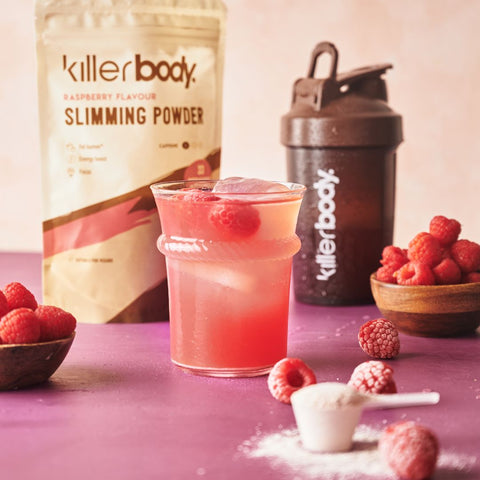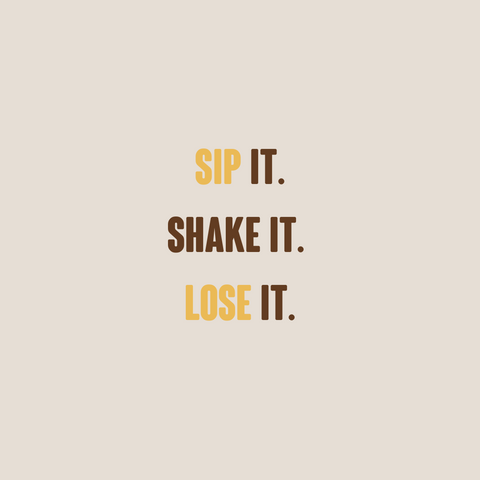You've been working out for years, you eat healthily, you've always been conscious of your body. And suddenly... those few extra pounds. Your pants feel tighter, your stomach feels fuller. Even though you haven't increased your food intake and your workout routine has remained the same. Very frustrating, right?
Welcome to menopause.
And believe me, you're not alone. Women who've been fit their whole lives suddenly notice their bodies behaving differently. Where a few extra workouts and a week of attention used to get you back in shape, that no longer seems to work.
Why your body does this
Menopause is essentially a reset. Your hormones drop, changing the way your body stores fat and builds muscle.
-
Less estrogen means fat moves from the hips and buttocks to the belly.
-
Less muscle mass means your calorie burn goes down, even if you eat and train as usual.
-
Poor sleep due to night sweats or restlessness leads to increased cortisol (the stress hormone). And yes, that hormone stimulates fat storage around the abdomen.
-
More stress, no matter how healthy you live, makes your body more sensitive to stimuli, which makes losing weight less natural.
Maybe you recognize this: you're at the gym, doing your workouts as usual, but your jeans say otherwise. Or you notice that after a night of snacking, you're being punished much more harshly by the scale than before.
What not to do
The first reflex is often: I'll exercise harder and eat less. But that's exactly the wrong strategy.
-
Too much cardio exhausts your body and increases cortisol.
-
Eating too little slows down your metabolism even more.
-
Strict diets may give you results for a while, but they also cost you muscle mass and that is exactly what you need right now.
Think of it this way: your body no longer works according to the old manual. Time for a new one.
What you should do
-
Strength training above all
Your muscles are your greatest ally right now. The more muscle mass you have, the higher your calorie burn, even when you're doing nothing. Focus on large muscle groups: squats, deadlifts, push-ups, pull-downs, bench presses. Lift heavy enough to challenge your body. -
Cardio, but smart
You don't have to eliminate cardio, but make it more effective. Short interval training sessions or HIIT have a much greater impact on your insulin sensitivity and belly fat than endless jogging. -
Eat more protein
Many women still don't eat enough protein. Aim for at least 1.6g per kilogram of body weight. For a woman weighing 70kg, that easily translates to 110–120 grams per day. Protein helps maintain muscle mass, keeps you feeling full, and keeps your energy levels stable. Think eggs, chicken, fish, cottage cheese, beans, or a good shake. -
Rest and sleep are your secret weapon
This is perhaps the biggest challenge. Bad nights due to menopause are killing your hormones. Create an evening routine, limit screen time, and keep your bedroom cool. Consider sleep just as important as your workout. -
Dare to renew your approach
It might feel unfair that what used to work doesn't anymore. But see it as an opportunity to grow. Try new workouts, experiment with nutrition, and discover what works best for your body now.
What that looks like in practice
Suppose you always train 4–5 times a week. Then your schedule during the transition might look like this:
-
2 days of strength training (full body focus, heavy enough)
-
1 day of interval training (short and intense, for example 30 seconds sprint – 1 minute walk, repeat)
-
1 day of gentle exercise (walking, yoga, cycling)
-
Extra attention to recovery (stretching, sauna, meditation, or just rest)
In terms of nutrition, you can already make significant gains by making simple switches:
-
Replace your cheese sandwich with a vegetable omelet.
-
Swap pasta for a meal salad with chicken or salmon.
-
Have a protein-rich snack after your workout instead of just a piece of fruit.
You are in control
Menopause can sometimes feel unfair: you're doing everything right, and yet your body is changing. But this isn't the end; it's a transition to a new phase. It calls for a different approach, not more discipline (which you've already demonstrated), but the right strategy.
See it as an opportunity to reinvent yourself. Your body is changing, but you're in charge of how you deal with it. And believe me: staying stronger, fitter, and more energetic is truly possible, even now.
Don't expect miracles in a week. Give yourself time to settle into your new routine. Menopause is a marathon, not a sprint. But if you take the right steps, you'll find yourself getting your body back—stronger than ever.
Eating during menopause
Menopause can significantly unbalance your body. That's why we've collaborated with orthomolecular nutritionist Nananke Schreurs to develop recipes in the Killer Body Food app to support you through this phase. Our dishes are rich in the right nutrients to help maintain your energy levels, balance your hormones, and help you feel better about yourself. Delicious, nutritious, and tailored to your body's current needs.




